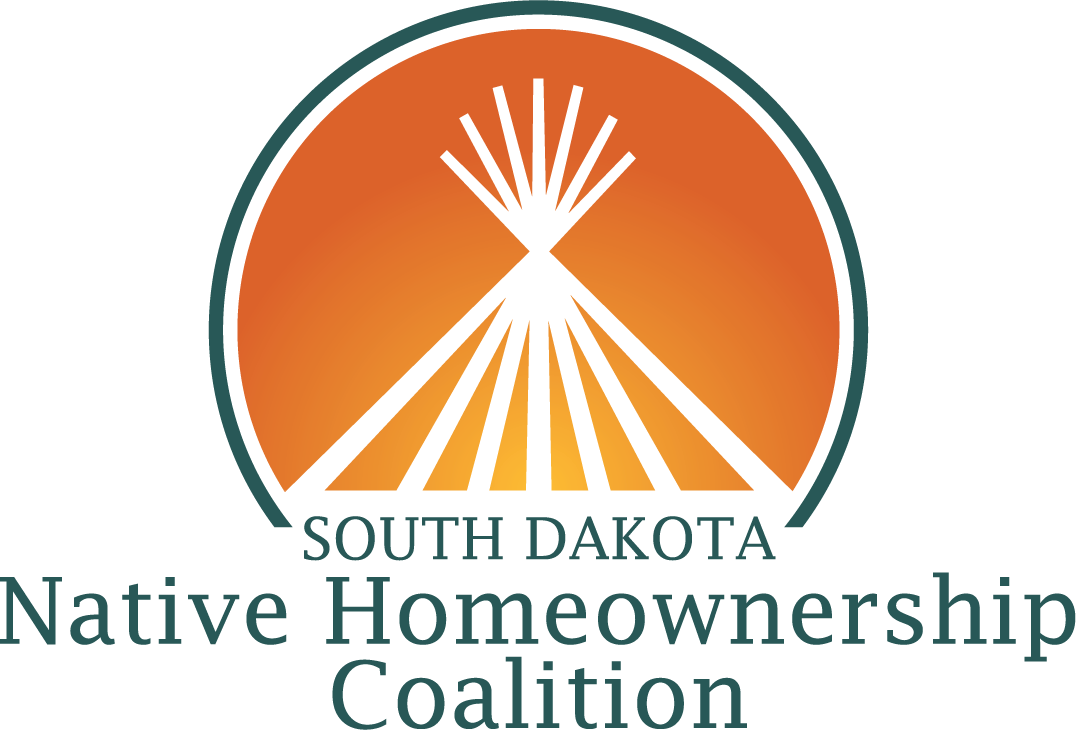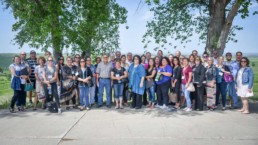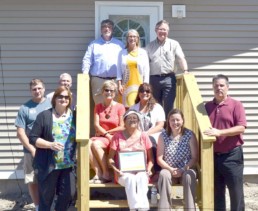Coalition Celebrates USDA 502 Relending Pilot
The US Department of Agriculture’s Assistant to the Secretary for Rural Development, Anne Hazlett visited the Pine Ridge Reservation to meet with Four Bands Community Fund, Mazaska Owecaso Otipi Financial, and other regional partners to discuss the launch of a pilot program to increase homeownership opportunities on tribal lands. Through the 502 Relending Pilot, USDA Rural Development is partnering with Four Bands and Mazaska, both Native community development financial institutions and active Coalition members, to deploy a total of $2,000,000 to eligible Native American homebuyers located in tribal communities of South Dakota and North Dakota. According to USDA, the CDFIs’ deep ties in local communities will help them to reach homebuyers more effectively than other lenders.
The Coalition is excited to see this new development and has been actively advocating for this model as a solution to increase access to USDA’s home loan programs for Native American families. Our efforts, led by our Policy Committee Co-chairpersons, JC Crawford and Sharon Vogel, have included engaging partners and policy makers in various meetings and briefings over the past four-plus years. By creating alliances and identifying champions, we continued to raise awareness of challenges and opportunities related to homeownership and Native American communities.
We’d like to express our gratitude especially to U.S. Senator John Thune (R-SD), as well as U.S. Senator Mike Rounds (R-SD) and U.S. Representative Kristi Noem (R-SD). The South Dakota delegation requested that USDA implement the pilot and recognized that while the 502 Direct Loan program is highly utilized, only 23 of the 7,187 loans made through the program in fiscal year 2017 went to Native American families on tribal lands. We’d also like to recognize U.S. Senators John Hoeven (D-ND) and Heidi Heitkamp (D-ND) who were instrumental in launching the pilot.
The Coalition will continue working with these legislators and USDA Rural Development as the pilot experiences great success. We anticipate that the 502 Relending Program will expand throughout Indian Country and hope it will be a model for creating greater access to other federal mortgage programs on tribal lands.
Thanks to the US Department of Agriculture for contributing photos of Ms. Hazlett’s visit!
Yankton Sioux Tribe Hosts Coalition’s 5th Annual Tour & Convening
On June 6, 2018, over 50 of our members joined with more than 25 members of the Yankton Sioux Tribe for the Coalition’s 5th Annual Homeownership Tour & Convening. Hosted by the Business and Claims Committee of the Yankton Sioux Tribe, the day opened with a Veterans flag presentation and drum group, and welcome remarks by Tribal Chairman Robert Flying Hawk as well as other members of the Committee.
The convening provided the opportunity to learn about:
- The Tribe’s plans for homeownership
- Preview the Coalition’s new video series showing that “Native Homeownership is Possible”
- Share updates and accomplishments
For many Coalition members, the tour of the Reservation was the highlight of the day. During the tour, David LeCompte, the BIA Deputy Superintendent, pointed out different sites that had been identified for future homeownership development. Many of these sites already have existing infrastructure, including water, wastewater, and access to roads.
According to Tawney Brunsch, Executive Director of Lakota Funds and a Coalition member,
“I was struck by the opportunity for homeownership with all of the land available.”
As part of the day’s agenda, Coalition members also heard directly from homeowners about their experiences and the benefits of homeownership. Tribal Veterans Service Officer Dennis Rucker shared his experience in qualifying for a Native American Direct Loan from the US Department of Veterans Affairs, while Kenny Cook, the Treasurer of the Yankton Sioux Tribe, shared his experience in accessing a 502 Direct Loan through USDA Rural Development.
During reflections at the conclusion of the day, Coalition members recognized the importance of the Tribe’s support.
According to one Coalition member,
“The support we have seen from the Tribe is outstanding. Thank you to Tribal Council for promoting homeownership.”
Green Living Practices
The day following the Tour & Convening, several homeownership practitioners gathered for a training session, “Healthy Homes, Healthy Communities.” Focusing on eco-friendly living practices, the training was born out of recognition of the importance of incorporating healthy living practices into post-purchase counseling. It also took into account how green practices can reduce utilities and maintenance costs associated with homeownership, which is a top priority for low-income communities. Training participants were immersed in lessons on using traditional plants, incorporating efficiency into daily habits, and utilizing nontoxic products for maintenance.
Ana Catches, Homeownership and Housing Initiative Coordinator at Thunder Valley Community Development Corporation, attended the training and said this,
“I was able to learn about traditional plants – how they are used for different remedies for homes and families and for clean air quality in homes. I learned about behavior on how to be a smart homeowner and consumer when making purchases on building products and cleaning supplies, and when building a new house to avoid products with high volumes of VOC.”
Upon completing the training, attendees all agreed that practicing sustainable and green living to create a healthy home environment was well worth the investment as it reduces long-term expenses for homeowners and their communities.
Coalition Partners Join Forces to Make Homeownership Dream a Reality
In early June, Sherry Morgan, an enrolled member of the Crow Creek Sioux Tribe, realized her dream of homeownership with the help and support from several of our Coalition members. She now owns a home located on her parents’ leased land where she lived as a young girl.
In recognizing her great accomplishment, a celebratory event was held at Sherry’s home on June 5, 2018, and attended by several partner organizations, family, and community members. During the event, a Crow Creek elder blessed Sherry’s home, and an honor song was performed by the local drum group Bad Nation. USDA Rural Development Director, Julie Gross, presented Sherry with a certificate, and a meal was shared by all who attended.
During the event, Sherry said,
“The feelings are overwhelming for me as a first-time homeowner. Having this home built on the previous site of where my mom and dad lived makes it bittersweet.”
The innovative way in which Coalition members worked together created a path to homeownership for Sherry. This project is USDA Rural Development’s first 502 New Construction Direct Loan with the South Dakota Housing Development Authority’s Governor’s House Program on the Crow Creek Indian Reservation. USDA Rural Development leveraged the 502 Loan with Federal Home Loan Bank’s Native American Homeownership Initiative (NAHI) program through Dacotah Bank, as well as the Crow Creek Housing Authority to assist Sherry with the purchase of the Governor’s House. She also received funds through the Homes are Possible, Inc. (HAPI) grant program for closing costs.
Although Sherry’s homeownership journey was nearly two years, she was driven and committed through the entire process. She hopes that by sharing her story, it will inspire others to jump in with both feet to obtain homeownership.
Coalition Launches “Native Homeownership is Possible” Campaign
We are pleased to announce that we have launched our “Native Homeownership is Possible” campaign through a new website at www.nativehomeownership.com. The website includes a series of short videos designed to:
- Raise awareness of the concept of homeownership in reservation communities.
- Implore that homeownership is possible for Native Americans.
- Inspire and encourage Native American individuals and families to start on the path to homeownership.
In addition, the website features contacts listed by reservation and off-reservation areas that people can access to start on their path to homeownership.
We encourage all of our stakeholders to share these inspiring videos to help spread the message that “Native Homeownership is Possible.”




